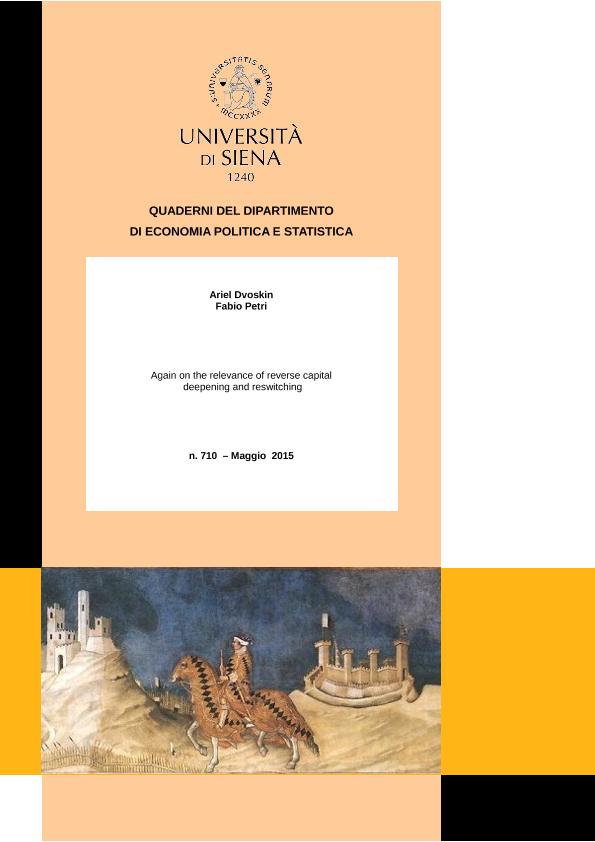Mostrar el registro sencillo del ítem
dc.contributor.author
Dvoskin, Ariel

dc.contributor.author
Petri, Fabio
dc.date.available
2018-07-17T13:16:45Z
dc.date.issued
2015-05
dc.identifier.citation
Dvoskin, Ariel; Petri, Fabio; Again on the relevance of reverse capital deepening and reswitching; Universitá degli Studi di Siena. Dipartimento di Economia Politica e Statistica; Quaderni del Dipartimento di Economia Politica e Statistica; 2015; 710; 5-2015; 1-32
dc.identifier.issn
1720-9668
dc.identifier.uri
http://hdl.handle.net/11336/52344
dc.description.abstract
Among the recent interventions in the capital controversy, the debate between Paola Potestio and Kurz&Salvadori has raised important issues. We agree with Potestio’s rejection of the legitimacy of a value endowment of capital but we disagree with her dismissal of the relevance of reswitching and reverse capital deepening: these phenomena are very important because they undermine the demand-side role of the conception of capital as a single factor. For the marginal approach to be plausible, this demand-side role had to imply the stability of the savings-investment market even in shorter time frames than those required by a complete adaptation of the ‘form’ of capital; this was taken by Marshall to authorize doing without a given endowment of value capital, which opened the door to the shift to the modern neo-Walrasian versions of the marginal approach. With proof from Hayek, Hicks, Malinvaud and Lucas we argue that a continuing belief in traditional time-consuming marginalist disequilibrium adjustments based on capital-labour substitution is the hidden reason why the claim, often made by contemporary marginalist economists, that the economy can be assumed to be all the time on the equilibrium-growth path is not found patently unacceptable. The true microfoundation of DSGE macromodels is not intertemporal equilibrium theory, but the adjustment mechanisms on whose basis the marginal approach was born and accepted, and on whose basis monetarism was then able to re-assert a pre-Keynesian view of the working of the economy.
dc.format
application/pdf
dc.language.iso
eng
dc.publisher
Universitá degli Studi di Siena. Dipartimento di Economia Politica e Statistica
dc.rights
info:eu-repo/semantics/openAccess
dc.rights.uri
https://creativecommons.org/licenses/by-nc-sa/2.5/ar/
dc.subject
Capital
dc.subject
Marshallian Equilibrium
dc.subject
Neowalrasian Equilibrium
dc.subject
Reverse Capital Deepening
dc.subject
Reswtiching
dc.subject
Savings-Investment Market
dc.subject.classification
Economía, Econometría

dc.subject.classification
Economía y Negocios

dc.subject.classification
CIENCIAS SOCIALES

dc.title
Again on the relevance of reverse capital deepening and reswitching
dc.type
info:eu-repo/semantics/article
dc.type
info:ar-repo/semantics/artículo
dc.type
info:eu-repo/semantics/publishedVersion
dc.date.updated
2018-07-13T17:28:25Z
dc.journal.volume
2015
dc.journal.number
710
dc.journal.pagination
1-32
dc.journal.pais
Italia

dc.journal.ciudad
Siena
dc.description.fil
Fil: Dvoskin, Ariel. Universidad de Buenos Aires; Argentina. Consejo Nacional de Investigaciones Científicas y Técnicas; Argentina
dc.description.fil
Fil: Petri, Fabio. Università degli Studi di Siena; Italia
dc.journal.title
Quaderni del Dipartimento di Economia Politica e Statistica
dc.relation.alternativeid
info:eu-repo/semantics/altIdentifier/url/https://www.deps.unisi.it/it/ricerca/pubblicazioni-deps/quaderni-deps/anno-2015-da-n704-n/710-again-relevance-reverse-capital
Archivos asociados
